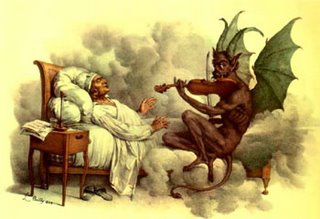Tartini

If somebody would have walked into Jack Warner's office with a script about the life of violinist/composer Giuseppe Tartini, he might've sent for Errol Flynn to play the lead. It's got everything: romance, swordplay, a villainous cardinal, and even a demonic apparition!
Giuseppe Tartini, born on this day in Pirano (now in Slovenia) in 1692, was the son of a successful merchant who planned for his son to take holy orders and become a Franciscan monk.
After a few years studying as a candidate for the priesthood, at 16 Tartini ran away from the cloister and went to Padua. There he studied law at the University while pursuing his obsessions of the moment -- the art of fencing, and a young woman named Elizabeth Premazone. In 1710, Tartini eloped with Elizabeth, who was the niece of the bishop of Padua, the powerful Cardinal Giorgio Cornaro. When Cornaro found out 3 years later, he ordered Tartini to be arrested, for not only had Tartini tempted fate by his choice of bride, but he had somehow forgotten to renounce his candidacy for the priesthood. Tartini made a daring escape into the Italian countryside at sword's points, however, and eventually found secret refuge in the monastery at Assisi.
While in exile he put down his sword long enough to resume his boyhood pursuit of the violin, studying seriously for the first time with the Czech musician Bohuslav Ceznohorsky. Following some celebrated early performances at the monastery chapel, Tartini received word that he had been pardoned by the Cardinal and permitted to be reunited with Elizabeth, which paved the way for Tartini's public life as a violinist. He made rapid progress while studying briefly at Cremona, but turned down an invitation to enter a violin competition at Venice for further study at Ancona beginning in 1716, where his mechanical and acoustical curiosity led to him to discover the phenomenon of "resultant tones" -- tones that are produced as the sum and difference of two other tones produced by one or more instruments simultaneously -- which he referred to in his violin treatise as "terzo sono."
In 1721, he was appointed maestro de cappella at the Cathedral of Padua, a position which he kept for the rest of his life (except for 3 years in Prague in the service of Count Kinsky; some said he took the job in order to avoid a paternity suit by a woman in Venice). It also gave him the freedom he desired to play (as one of the great masters of the day, although he declined a tour of London, declaring that his one desire was "not to possess more than I already have"), teach (his violin pupils included Nardini and Graun), write violin theory and compose.
In 1740, a fencing wound forced him to give up playing, after which he devoted himself to composing. In all he wrote almost 200 violin concertos and 200 solo violin sonatas, as well as a trove of other chamber works and church music, most in a late Baroque/early Classical style. Tartini wrote many of his works in a strange code of lines, crosses and circles that was not deciphered until 1935.
His best known work, the "Devil's Trill" sonata, was inspired by a dream Tartini apparently had in 1713 in which he had made a pact with the devil (not unlike the similar devil-dealing legend surrounding 20th century blues guitarist Robert Johnson) and watched the devil at the foot of Tartini's bed playing a trill on the violin which ultimately became the trill in the final movement of the sonata. (Why is it that Satan only seems to concern himself with hand-held string instruments, leaving lesser acolytes like Vincent Price as "Dr. Phibes" to play the organ?) Tartini always lamented, however, that he wished what he had written was half as good as what he had heard in the dream.
Apropos of nothing, a "tartini" is a dreaded travesty of a Martini that was not in any way named after the composer. For those who wish to debase themselves, a tartini is made with 2 oz. of raspberry vodka, a splash of raspberry liqueur, a splash of cranberry juice, and a dash of lime juice, shaken with ice and garnished with a lime. Raspberries is what you shall get, and raspberries is what you shall deserve.
Labels: Classical Music, Cocktails





0 Comments:
Post a Comment
Subscribe to Post Comments [Atom]
<< Home